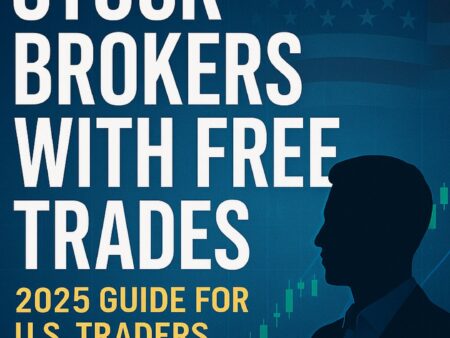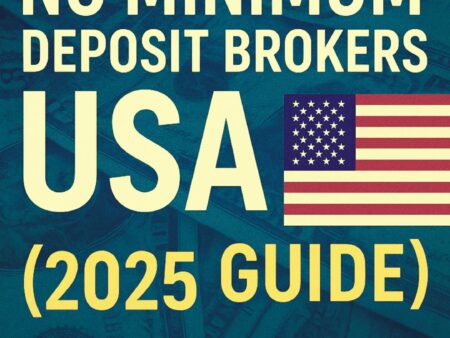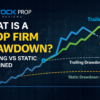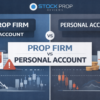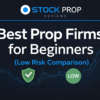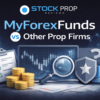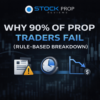Choosing the right stockbroker is one of the most important decisions you’ll make as a trader or investor. With dozens of options available, each offering different features, fees, and trading tools, it can feel overwhelming. That’s why we’ve created this in-depth guide to help you compare stock brokers in the USA and find the best trading platform for your needs.
Whether you’re a beginner dipping your toes into stock investing or an intermediate trader looking to reduce commissions and access advanced tools, this guide will walk you through everything you need to know.
Why Choosing the Right Broker Matters
The broker you choose can impact:
- Your profits (through commissions and fees)
- Your trading experience (through platforms and tools)
- What markets and assets you can access
- How easily you can deposit, withdraw, and manage your account
With the rise of online brokers and zero-commission trading, U.S. retail traders have more options than ever. But not all brokers are created equal.
Let’s explore the top stock brokers in the USA and see how they compare.
Top 6 Stock Brokers USA (2025)
Here’s a side-by-side comparison of six of the best U.S. stock brokers for beginner and intermediate traders:
| Broker | Commissions | Account Minimum | Best For | Platform Rating |
|---|---|---|---|---|
| Fidelity | $0 (stocks/ETFs) | $0 | Beginners, long-term investing | 4.7/5 |
| Charles Schwab | $0 (stocks/ETFs) | $0 | Full-service, retirement | 4.6/5 |
| Robinhood | $0 | $0 | Beginners, mobile trading | 4.2/5 |
| TD Ameritrade | $0 | $0 | Advanced tools, education | 4.8/5 |
| E*TRADE | $0 | $0 | Options trading, active users | 4.5/5 |
| Interactive Brokers | $0 (IBKR Lite) | $0 | Professionals, global access | 4.7/5 |
1. Fidelity Investments
Best for: Long-term investors, beginners, retirement planning

Pros:
- $0 commission for U.S. stocks and ETFs
- Excellent research tools
- Strong customer service
- Fractional shares available
Cons:
- Platform less suited for active day traders
Fidelity is widely trusted for its strong reputation, investor tools, and wide range of investment options. It also offers great retirement account features.
2. Charles Schwab
Best for: Retirement investors, ETFs, educational tools

Pros:
- Commission-free stock and ETF trading
- Schwab Intelligent Portfolios (Robo-advisor)
- Great beginner education
- Fractional shares via “Stock Slices”
Cons:
- Limited cryptocurrency access
Schwab is great for investors focused on long-term goals. Its platform balances simplicity with strong research capabilities.
3. Robinhood
Best for: Simplicity, beginners, mobile-first traders
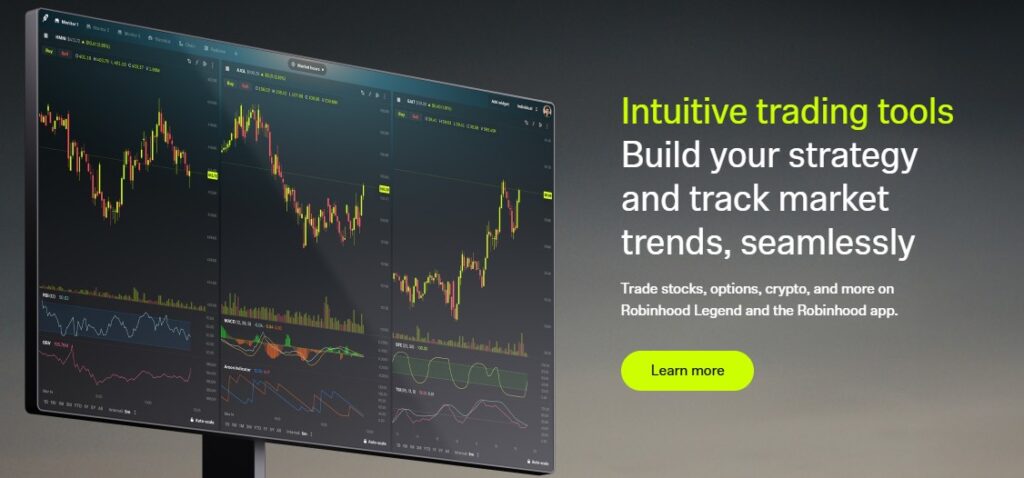
Pros:
- $0 commission for stocks, options, and crypto
- User-friendly mobile app
- No account minimum
- Quick onboarding
Cons:
- Limited research tools
- Controversial past outages
Robinhood helped pioneer commission-free trading, especially for younger traders. However, it lacks depth for serious or professional traders.
4. TD Ameritrade (Now part of Charles Schwab)
Best for: Education, tools, active traders
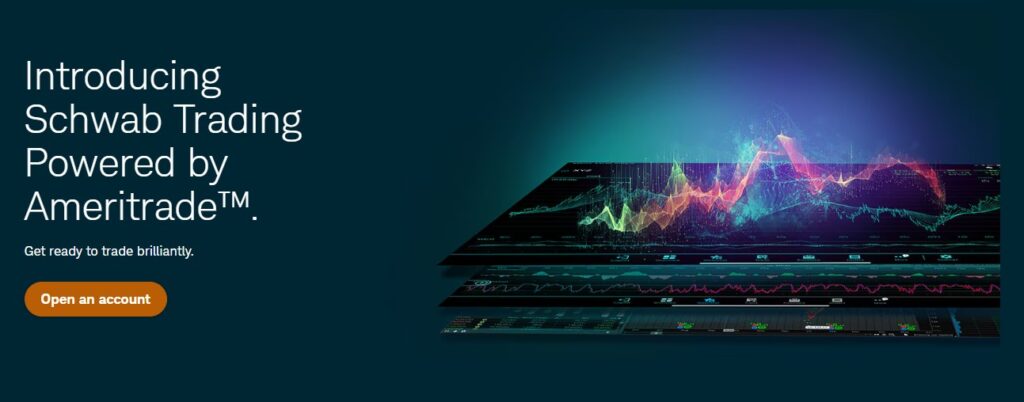
Pros:
- Thinkorswim trading platform (advanced charting)
- Paper trading account
- Educational content library
- Strong mobile and desktop apps
Cons:
- Slightly outdated web interface
Even though it’s merging with Schwab, TD Ameritrade’s Thinkorswim remains one of the most powerful platforms for active traders and technical analysis.
5. E*TRADE
Best for: Options traders, advanced desktop tools
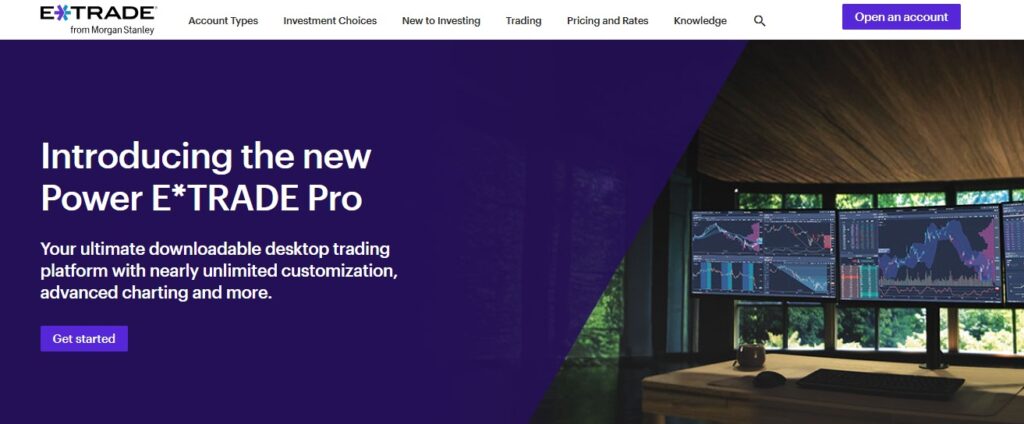
Pros:
- Powerful options trading tools
- Educational resources
- Commission-free stock/ETF trades
- Great mobile and web apps
Cons:
- Less intuitive for absolute beginners
ETRADE’s Power ETRADE platform is popular among options and derivatives traders. It also has strong retirement and savings account options.
6. Interactive Brokers (IBKR)
Best for: Global trading, low margin rates, professionals
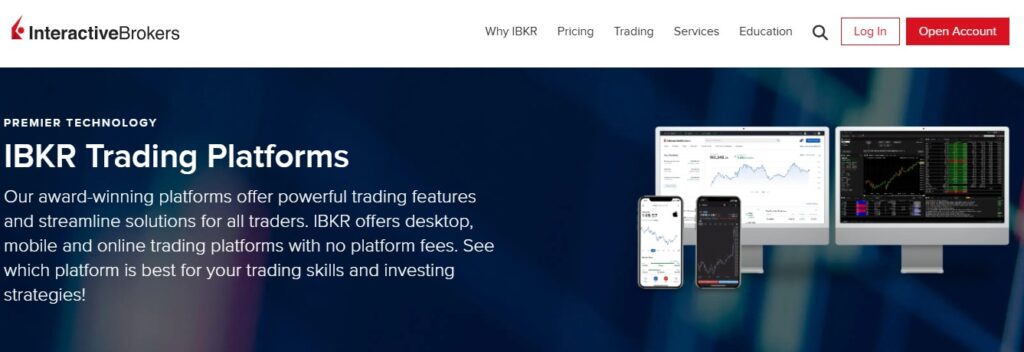
Pros:
- Access to 135+ markets worldwide
- Low margin interest rates
- Advanced trading tools
- IBKR Lite = zero commissions for U.S. stocks
Cons:
- Steeper learning curve
If you want access to international markets or trade high volumes, Interactive Brokers is a top choice. Their tools are unmatched in complexity and precision.
What to Consider When Choosing a Broker
Here are the key factors to compare:
1. Commission and Fees
- Stocks, ETFs: Most major brokers are $0 now
- Options: Per-contract fees vary ($0.50 to $0.65)
- Mutual Funds: Some are free, some cost $10–50
- Margin rates: Interactive Brokers offers the lowest
2. Trading Platform
- Mobile-first or desktop-friendly?
- Advanced charting and indicators?
- Paper trading or demo accounts?
3. Account Types
- Individual brokerage
- Retirement (Roth IRA, Traditional IRA)
- Custodial or joint accounts
4. Customer Support
- Is it easy to reach someone?
- Do they offer live chat or 24/7 support?
5. Education & Research
- Beginner tutorials?
- Technical/fundamental screeners?
- Daily analysis or newsletters?
6. Extras
- Fractional shares
- Crypto access
- Robo-advisors
Pricing Summary of Major Brokers
| Broker | Stocks/ETFs | Options (per contract) | Margin Rate (approx.) |
| Fidelity | $0 | $0.65 | 12.075% |
| Schwab | $0 | $0.65 | 13.575% |
| Robinhood | $0 | $0 (via Gold) | 12% |
| TD Ameritrade | $0 | $0.65 | 13.5% |
| E*TRADE | $0 | $0.65 | 13.45% |
| Interactive Brokers | $0 (IBKR Lite) | $0.65 | 6.83% |
Prop Trading: A New Option for Capital-Limited Traders
For traders who want to grow fast but don’t have a lot of capital, prop trading firms are becoming increasingly popular.
Many traders are also exploring TradeThePool stock prop firm in 2025 — these stock prop firms fund traders, so you can trade with little or no deposit.
What is TradeThePool?
TradeThePool is a stock-focused proprietary trading firm that allows remote traders to get funded after passing an evaluation. Once you qualify, you can trade with firm capital and share in the profits.
Key Features:
- No need to risk your own money
- Trade U.S. stocks remotely
- Daily risk limits and realistic rules
- Quick evaluation process
Prop firms help you get funded to trade remotely and can be a game-changer for those with skill but not much capital. Visit tradethepool.com to learn more.
FAQ: Stock Brokers USA
1. What is the best stock broker for beginners in the USA?
Fidelity and Charles Schwab are ideal for beginners due to their simple platforms, low fees, and great educational resources.
2. Are stock brokers in the U.S. regulated?
Yes. All reputable brokers are regulated by FINRA and the SEC.
3. What are commission-free trades?
These are trades that don’t incur a fee for buying or selling U.S. stocks or ETFs.
4. Can I trade without a large deposit?
Yes. Many brokers require no minimum deposit, and prop firms like TradeThePool allow you to trade without risking your own capital.
5. Which broker is best for mobile trading?
Robinhood offers the most streamlined mobile trading experience.
6. What are prop trading firms?
Prop trading firms fund traders with company capital, letting you earn profits without using your own money.
7. How do I choose between brokers?
Consider your trading style, need for tools, fee sensitivity, and support options.
Final Thoughts
Choosing the right broker is crucial for trading success. Whether you’re looking for low commissions, powerful platforms, or educational tools, the U.S. market has a broker that fits your goals.
Want to start trading without using your own money? Explore the top-rated stock prop firm ********tradethepool.com.
